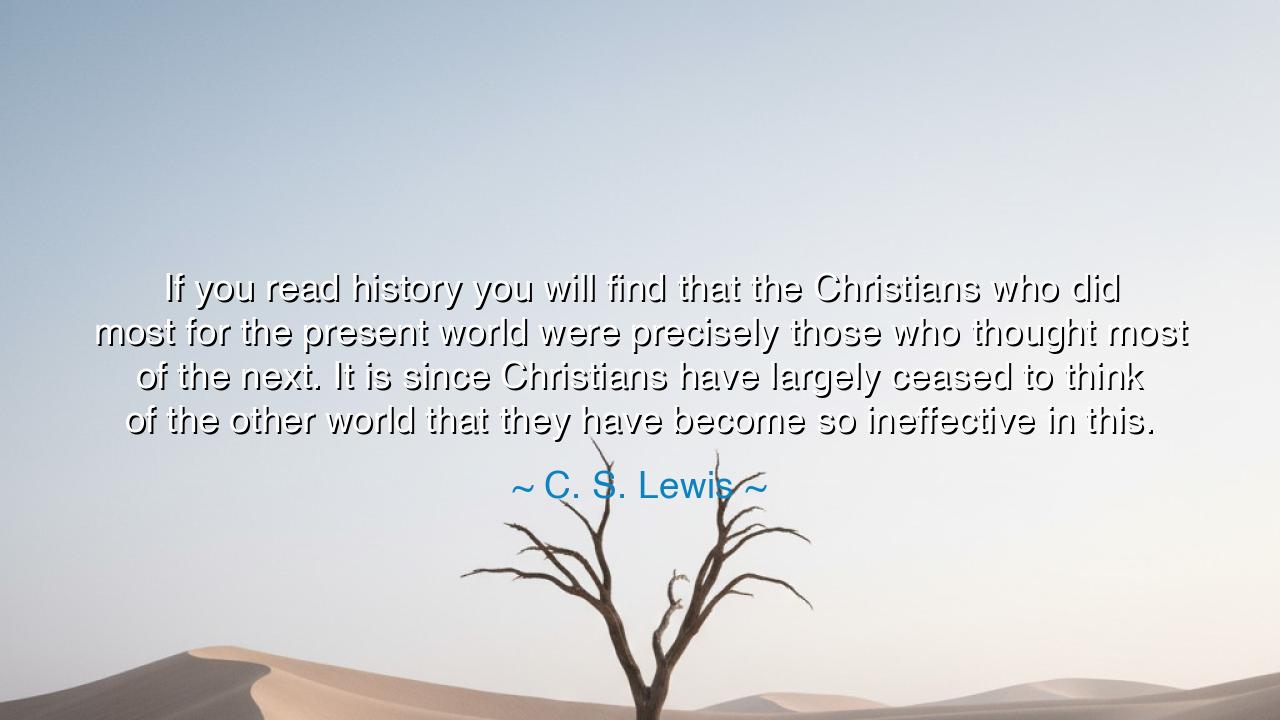
If you read history you will find that the Christians who did
If you read history you will find that the Christians who did most for the present world were precisely those who thought most of the next. It is since Christians have largely ceased to think of the other world that they have become so ineffective in this.






“If you read history you will find that the Christians who did most for the present world were precisely those who thought most of the next. It is since Christians have largely ceased to think of the other world that they have become so ineffective in this.” Thus spoke C. S. Lewis, philosopher, poet, and prophet of the modern soul — a man who saw clearly what others only dimly sensed: that the loss of eternity weakens the heart of mankind. His words, drawn from Mere Christianity, are not a rebuke alone, but a revelation — a reminder that when humanity forgets Heaven, Earth itself begins to decay. For in forgetting what lies beyond, we lose the very compass that gives meaning to what lies before us.
Lewis wrote this in the aftermath of war, amid the smoldering ruins of a Europe that had sought salvation through human progress, reason, and power — and found only despair. He observed that the greatest builders of civilization — the saints, the reformers, the founders of schools and hospitals — were men and women whose eyes were not fixed upon the world they could see, but upon the one they could not. They believed in eternity, and from that belief drew courage, mercy, and vision. They did not love the world less because they hoped for Heaven more; rather, their love was purified by the knowledge that this world was a shadow of something greater.
To understand this truth, we must look backward, to those who acted for Heaven’s sake and changed the Earth. Think of William Wilberforce, who fought tirelessly to end the slave trade in England. His battle was not for glory, but for the soul of man — for he saw in every captive the image of God. Or Mother Teresa, who walked among the dying not for reward, but out of love that flowed from eternity. Such people did not seek worldly success, and yet the world was transformed by their hands. They lived as pilgrims, with one foot in time and one in eternity — and it was that very tension that gave them power.
Lewis’s words recall the wisdom of the ancients, who knew that vision gives birth to virtue. When a people lifts its gaze toward the divine, its actions are ennobled; when it looks only to the dust, it becomes what it beholds. The empires of men crumble because they are built for men alone. But the works of faith endure, for they are rooted in the eternal. The cathedrals of Europe, rising like prayers in stone, were not built by those seeking fame, but by those who sought to glorify God. Their hands labored for centuries, their eyes fixed not on the present, but on the promise of Heaven — and so their work still stands.
Yet in the modern age, Lewis warns, mankind has turned its gaze downward. We have forgotten eternity, and so we stumble in confusion. We seek pleasure, not purpose; comfort, not calling. The result is an age of abundance without meaning — a world that grows cleverer but not wiser. The very energy that once built hospitals, sanctuaries, and universities now scatters itself in distractions. For when man forgets the next world, he loses sight of the reasons to serve this one. Only by restoring a vision of the eternal can the soul find again its strength to act.
But Lewis does not condemn; he instructs. He calls upon each soul to think of Heaven not as escape, but as direction. To live for the next world is not to abandon this one — it is to understand it rightly. If eternity is real, then every act of kindness echoes forever. If Heaven awaits, then every moment on Earth is preparation. To live in light of eternity is to invest every breath with sacred meaning. This is not otherworldly neglect, but divine engagement — the discipline of those who know that time is a gift, not a possession.
And so, my children, take this lesson to heart: lift your eyes beyond the horizon of your days. Do not let your soul be trapped in the fleeting glitter of the present. Work for justice, mercy, and truth — but do so with your heart set on Heaven. Remember that all great deeds are born of great hope, and the greatest hope is eternal. Build as if your works were to last forever; love as if each soul were immortal; live as if today were the threshold of eternity. For in doing so, you will not only touch Heaven — you will redeem the Earth.
Thus, the wisdom of C. S. Lewis endures: the world is changed most by those who are not bound to it. When you live for what is beyond time, your deeds transcend it. Therefore, think of Heaven — not as a distant dream, but as the light by which all things are seen. And in that light, live bravely, act nobly, and leave behind a legacy worthy of both Earth and Heaven.






AAdministratorAdministrator
Welcome, honored guests. Please leave a comment, we will respond soon